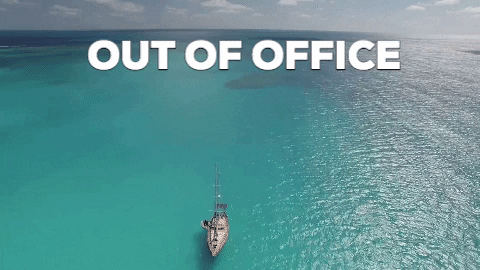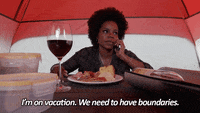Summer Holiday Special
5 in 5 - Brave & Heart HeartBeat #169 ❤️
This week, many of you will be on vacation, some of us certainly are.
Unless, you’re about to take your vacation, and currently spending your days vacillating between dreaming about being poolside, or stressing about everything you need to do beforehand. Don’t worry, we’re here to give you some tips.
Or, you’ll be on your way back from vacation, and experiencing the Sunday scaries x100. Again, don’t worry – we’ve got tips for that too.
Unless you’re not taking any vacation at all, and we’re here to tell you why that might be a bad idea.
Let's get into it.
Were you forwarded this? Not a subscriber? 👉 Sign up here
#1 - Is It Burnout… Or Do You Just Need A Vacation?
We talk a lot about burnout these days, and that’s a good thing, burnout is a serious problem that has caused a lot of suffering in the work world.
However, if you’re nearing the end of a hard slog at work, you may be wondering if you’re nearing burnout – a dangerous health condition - or if you just need a break, to relight the flame. How can you tell?
According to Forbes, these are the things to watch out for:
Firstly, consider your patience and creativity levels. If you’re losing your patience at the slightest of work bumps in the road, or can’t think of ANYTHING, and we mean writers block over emails, you may be in need of a break.
If you still feel the same after a break, you might want to have a serious think about your current role. Feeling like you’re dreading work is obviously a signal telling you that burnout may be underway, or on the way, and if that feeling gets worse when you return from vacation, it’s a sign. And we don’t mean the usual feeling of wanting to stay on the beach, but really dreading returning to work.
Try and measure your feelings, in intensity and duration. For example, if the burnt out feeling subsides a little over the weekend, then maybe you just need a longer break to fully recharge. And look out for the physical manifestations of burnout – weight gain, weight loss, hair loss, and stopping other activities that you regularly did before, like working out or reading.
Additionally, the feeling of really really needing a vacation can be read as a signal that you’re on the verge of burning out, even if you’re not already there. Experts suggest to take at least five days, a long weekend isn’t going to cut it here, and take a vacation that’s easy on the planning - even if that means staying at home and chilling in the garden.
#2 - Pre-Vacation Stress
Now you know you need a vacation, but do you feel like the time coming up to your vacation usually so stressful that you feel like you need to take a vacation from taking your vacation?
Handovers, finishing up projects, the niggling stress that there’s something you’ve forgotten to do… it takes a toll, and by the time you’re ready to go on holiday your energy is in the minus levels and the holiday top-up has even more work to do.
Apparently, this pre-vacation rush and the stress that comes with it has something to do with our attitude towards work and holidays, certainly in the US and the UK.
A European perspective from an organisational behaviour professor at a French business school notes that in European cultures, for example in France or in Italy, the week before vacation isn’t much more stressful than any other. She notes that the key difference lies in the way the cultures look at leisure time.
In American business culture, there is a sense that you’re doing something “naughty” by going on holiday. You want to make sure everything will run perfectly in your absence, as if you were still there, because in a sense you believe you still should be.
By rushing to get everything finished before going on holiday, you’re trying to compensate for the time spent on holiday. That project that would normally have a finish date when you’re on vacation, well you need to finish it early. Rather than, for example, passing it onto another colleague to finish while you’re out, or simply putting it on hold.
Obviously, it’s not always that simple. If you work with clients, they can’t always wait, and you don’t expect them to, and you certainly don’t want to burden your colleagues with extra work while your OOO.
This is where another European custom comes in helpful – long holidays in August. In August, pretty much everyone in the corporate world - a good 80%, at least – goes on holiday. That way, nobody will be waiting around for your project, they’re all on the beach too.
Maybe we should give it a go?
#3 - Setting Holiday Boundaries
How can you really be sure to switch off during your vacation, without getting sucked back into work, without having to throw your phone in the Trevi Fountain, the Mediterranean Sea, or even Loch Ness? And no, the answer isn’t to just not take it with you.
The answer is setting boundaries before you go, to ensure that your vacation time is respected, which can be harder than it sounds if you work in a company where the culture requires you to be connected 24/7, or you’re one of the lucky/unlucky few still working at X-Twitter.
Firstly, make sure everyone knows you’ll be on vacation. Make it clear to your manager that you’re taking actual time off where you won’t be available. You don’t need to pretend that you won’t have Wi-Fi or phone service, just that you’ll be out of office, on vacation.
One trick to ensure people remember, is blocking out the calendar. You can set your work calendar as on vacation, and some have even suggested sending an all-day meeting request to your boss and collaborators that states you’re out of office – that way it’s visible in their calendar in advance. This seems a bit passive aggressive, but we’ve certainly been in jobs where it would have been necessary, and we’re sure you have too.
If people do send you meeting requests in advance for when you’ll be out of office, respond clearly that you’ll be on vacation, rather than just rejecting or re-arranging.
Finally, give a reminder the week before your vacation that the big day is coming up around the corner – you’ll be unreachable. If anyone has any last minute questions, now’s the time, because you won’t be answering them on vacation.
And most importantly, try not to read work texts or emails – once you open the work door it can be almost impossible to shut it again. You need to let your vacation do its job, and you can’t do that if you’ve got one foot in work mode while the other’s in the pool.
#4 - Post Holiday Blues
According to LinkedIn, 80% of professionals experience the Sunday Scaries on steroids when they return to work after a vacation.
So, what can you do to alleviate some of that anxiety when you get back from your holiday?
First of all, some pre planning before you take your vacation (as long as you don’t go overboard as we discussed above) is always helpful to ensure you don’t dread coming back to a mess. For example, delegate, and add the emails of the colleagues who’ll be taking on some of your work when you’re out of office, so anyone who emails you knows who to call in your absence – and doesn’t send you hundreds of emails to be read on your return.
Then, when you do get back and into your emails – take a step back. An article we read suggests looking at your emails a couple of days early to know what to expect when you get back and have your to-do list ready, but we say, a holiday is a holiday. So, in the same vein, when you arrive on the first day don’t dive right into the first task you see when you open your inbox. Read them all, make an action plan, make a coffee, and get into it.
Block time out to catch up on pressing tasks (notice we didn’t use the word urgent, you don’t work at the White House, probably). Time-blocking is an effective organisational tactic to ensure you get deep work done, and can be used year round, but it can be especially effective when you get back from holiday.
And finally, remember, Rome wasn’t built in a day. You may not be able to fully catch up on your first day back, and that’s okay. Work at your normal pace and don’t stress yourself out trying to gain lost productivity. That’s what a vacation is, and that’s the whole point of it!
#5 - What Is A Workcation ?
Made possible, and then popular, by remote work practices in the wake of the pandemic, a “workcation” is when you change your remote work location, to somewhere a bit vacation-y, but keep on about your workday as normal.
For example, one remote worker was taking ten days in the Lake District, working his normal day and doing more holiday type activities at evenings and weekends. Another, braver or simply madder, remote worker, decided to backpack through India for two weeks while working her normal job via her laptop.
While the backpacker in question said she knew it was just the thing to get her out of a creative slump, and enjoyed the experience, we remain skeptical on the idea of the workcation, which while touted as bringing you the best of both worlds, may actually just bring you the worst of each.
It may seem like the perfect loophole, you can get an extra vacation in without taking any vacation, you’re not behind on work when you get back and you still get paid, but there is a “but” here. You’ll probably end up not being fully present in either, and travelling isn’t exactly free – it’s not a great idea to shell out on travel and board and then not be able to enjoy it because you’re working the whole time.
Your work will also probably suffer, because you’ll be thinking about everything else you could be doing the whole time. The aforementioned backpacker had a creative job, which probably means she was working to deadlines rather than on a 9-5 schedule – if she can fit the work in around all the paragliding she apparently did, no problem.
For the majority of the remote working world however, it would be pretty frustrating to be on a call making small talk with colleagues and clients, while the beach is calling to you from just outside the window.
If you do want a little break, the best way to do it is probably to take advantage of remote working to maybe make the travel a little bit easier, arrive on a Wednesday night for example and work the Thursday – but do take off the Friday and Monday and have an actual long weekend. Your brain will thank you for switching off, rather than switching two things on – work and holiday mode at the same time – because you’ve only got a certain amount of energy to power everything.
Brave & Heart over and out.
Bonus
The Worst Vacations
Are you currently on vacation and having a not so great time? Family getting on your nerves, mosquito bites itching you, sunburn?
Or are you having a great time, but just enjoy reading about the suffering of others?
Have a look at this list of vacations gone wrong.
To find out more on how you can retain your top talent, or how we can help you with digital solutions to your business and marketing challenges, check out our case studies.



